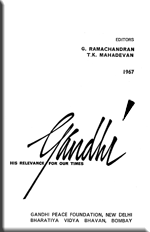
P.O. SEVAGRAM, DIST.WARDHA 442102, MS, INDIA. Phone: 91-7152-284753
FOUNDED BY MAHATMA GANDHI IN 1936
GANDHI
His Relevance For Our Times

GANDHI -
His Relevance For Our Times
Table of Contents
- The Tradition of Nonviolence and its Underlying Forces
- A Study of the Meanings of Nonviolence
- Notes on the Theory of Nonviolence
- Nonviolence as a Positive Concept
- Experimentation in Nonviolence: The Next Phase
- Satyagraha versus Duragraha: The Limits of Symbolic Violence
- The Best Solver of Conflicts
- The Spiritual Basis of Satyagraha
- Satyagraha as a Mirror
- Why Did Gandhi Fail?
- Gandhi's Political Significance Today
- Violence and Power Politics
- India Yet Must Show The Way
- War and What Price Freedom
- A Coordinated Approach to Disarmament
- A Disarmament Adequate to Our Times
- The Impact of Gandhi on the U.S. Peace Movement
- Nonviolence and Mississippi
- Aspects of Nonviolence in American Culture
- The Gandhian Approach to World Peace
- The Grass-roots of World Peace
- Is There a Nonviolent Road to a Peaceful World?
- Nuclear Explosions and World Peace
- The Gandhian Way and Nuclear War
- A Gandhian Model for World Politics
- A Nonviolent International Authority
- Basic Principles of Gandhism
- The Ideal and the Actual in Gandhi's Philosophy
- Means and Ends in Politics
- A Contemporary Interpretation of Ahimsa
- The True Spirit of Satyagraha
- Gandhi through the Eyes of the Gita
- Gandhi's Illustrious Antecedents
- Taking Sarvodaya to the People
- Epilogue: The Essence of Gandhi
- Sources
About This Book
Edited by : G. Ramachandran & T. K. Mahadevan
ISBN : 81-7229-348-8
Printed by : Kapur Printing Press,
Delhi,
India
Published by : Gandhi Peace Foundation
221/223 Deendayal Upadhyay Marg,
New Delhi 110 002,
India.
© Gandhi Peace Foundation
Download
Preface
To be wholly fruitful, the study of Gandhi should be more than historical it should be brought closer to our times and shown in relation to the needs and challenges of the nuclear age. this is one of the major preoccupations of the Gandhi Peace Foundation; and within limits, this is what the present book has attempted to do.
The limited first edition of the book was designed and produced as a presentation to Dr. R.R. Diwakar, Chairman of the Foundation, on his seventieth birthday. The present edition is a considerable revised and enlarged one, and is in many ways a more unified volume of studies. Some of the new material had first appeared in the pages of Gandhi Marg, the
quarterly journal of the Foundation.
Our chief thanks are due to the many writers on Gandhian themes who have made this volume possible; they have been unstinting in their cooperation. We should also like to thank the Bhartiya Vidya Bhavan for collaborating with us in the publication of the book; and Smt. Meera Mahadevan for reading the proofs and compiling the index.
G. Ramachandran
T. K. Mahadevan
Gandhi Peace Foundation
Introduction
Is Gandhi relevant to the world of today?
This is the question that is uppermost in the minds of all thinking people who have learnt to set great store by the revolutionary ideas of Gandhi and this is the question that this book tries to explore, objectively and from a great many points of view.
The study of Gandhi is not merely the study of his life, work and ideas, it is also the daily evolving application of those ideas to new challenges and situations. In this book the careful reader will find much new ground being uncovered before his eyes and many incentives to new thinking.
If the burden of the book is that Gandhi is intensely relevant to our times, it makes this assertion not dogmatically but with the humility of scientific exploration.